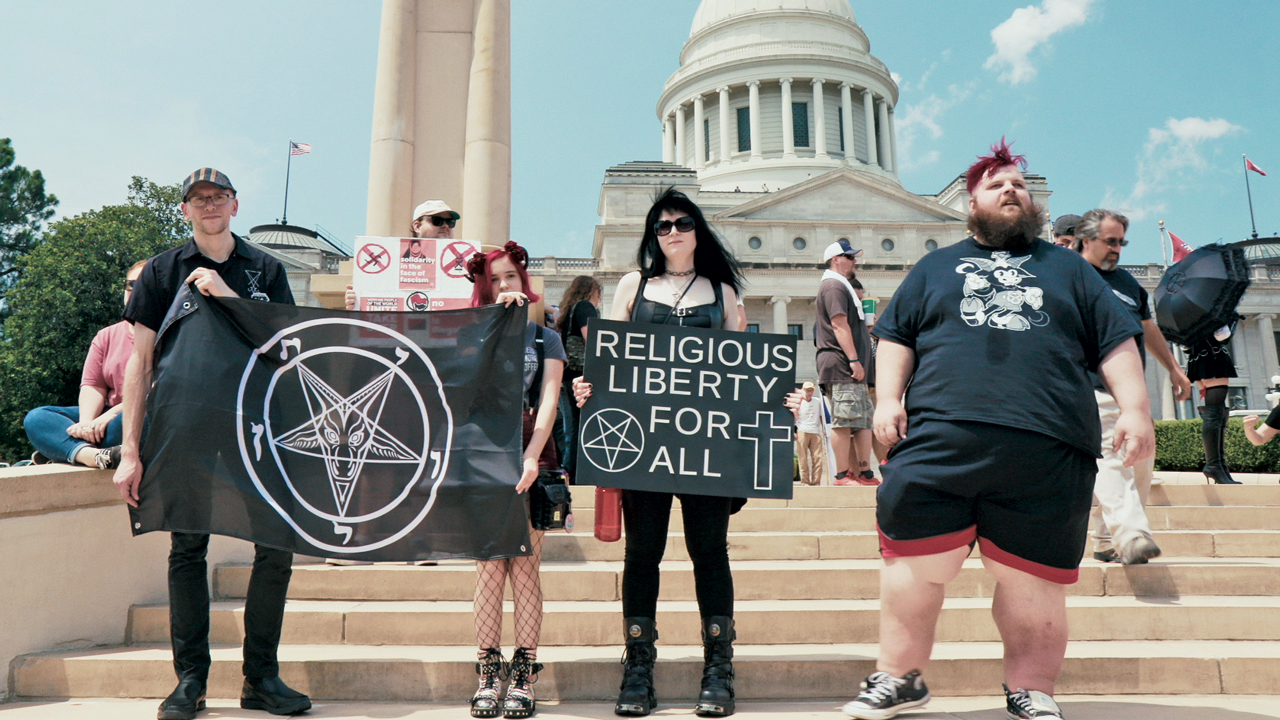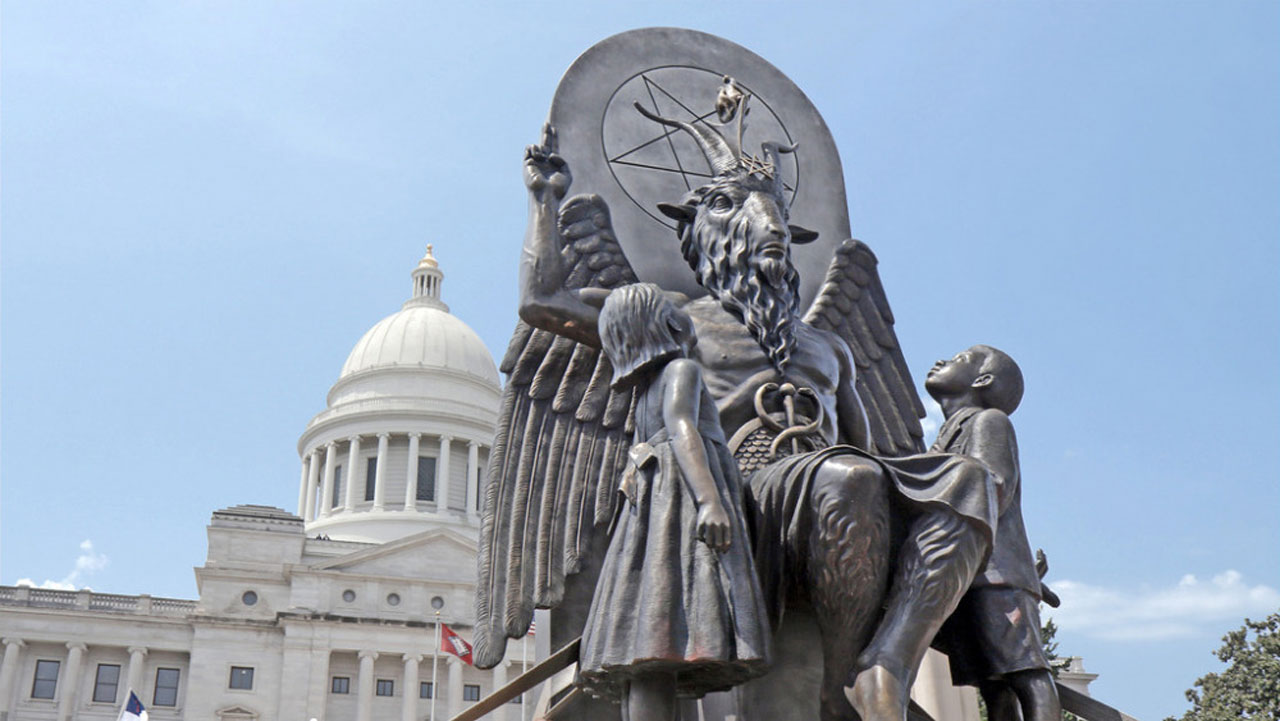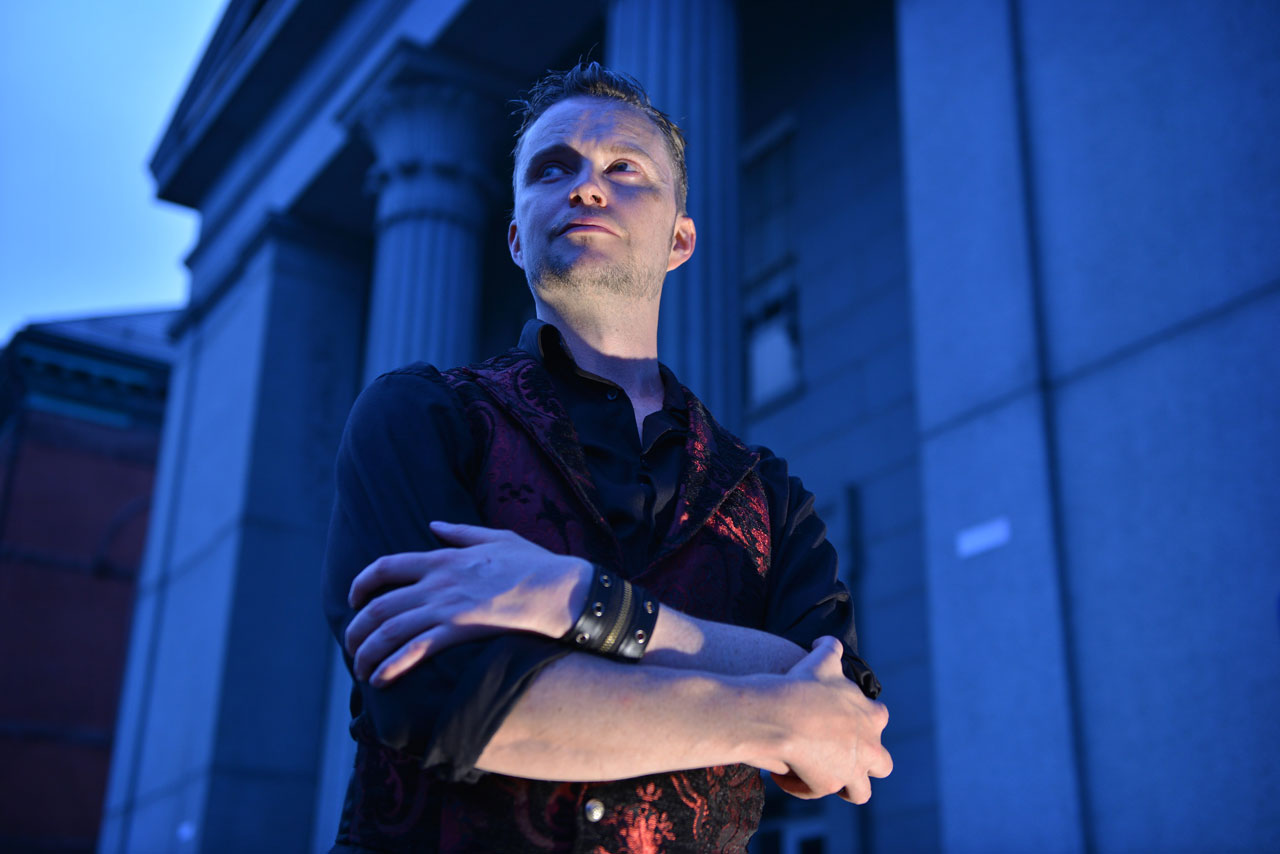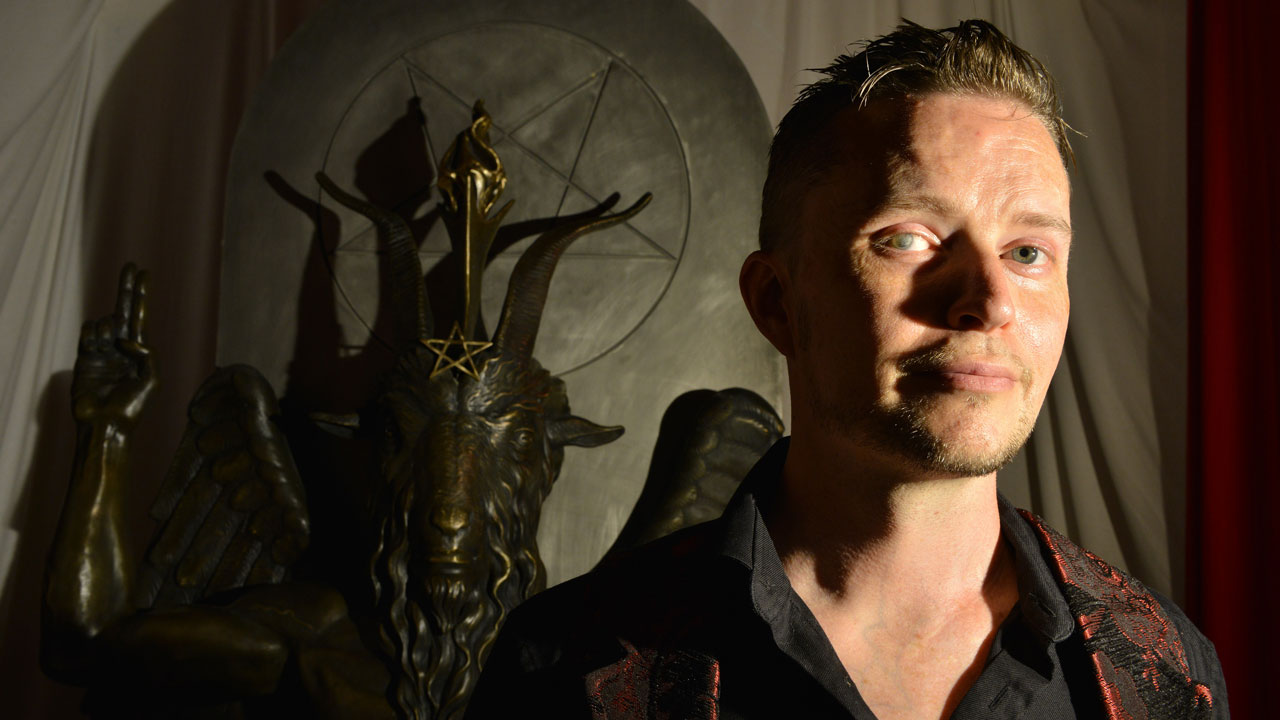Last week, Penny Lane's brilliantly illuminating documentary Hail Satan? hit cinema screens. The film aims to shine light on the rapidly growing non-theistic Satanic Temple.
The Satanic Temple, similarly to the Church of Satan, takes cues for its form of Satanism from humanist philosophies, as opposed to a theistic form of Satanism, which would literally involve worshipping the devil.
'Star' of the documentary is TST founder and spokesperson, the mild mannered, introverted intellectual Lucien Greaves. As a big avant and industrial metal fan, with a particular love for Mike Patton projects, we thought we'd catch up with him upon the release of Hail Satan? to discuss the film, the Satanic Temple and find out why so many metalheads are attracted to his religion.
Have you always had an interest in satan and satanism?
"My interest began when I was very young, when the Satanic Panic had reached levels of full hysteria.
"For a time, mainstream talk shows and news outlets were taking seriously bizarre conspiracy theory claims regarding secretive Satanic cults said to be breeding babies for sacrifices, cannibalizing missing persons, and working to undo the moral structure of civilization to enact world conquest on behalf of a supernatural evil.
"These remarkable claims stuck with me, and I was compelled to learn where they came from, slowly learning how irresponsible and unfounded they were.
"Ultimately, I came to recognize the Satanic Panic for the destructive and ignorant witch-hunt that it was -- claims of Satanic affiliation ruined lives, destroyed families, and even saw countless innocent people incarcerated; people who actually had no Satanic affiliations at all.
"During the time that this was all becoming apparent to me, I began exploring subcultures that do identify as Satanic, while reading texts from the Satanic literary tradition.
"Add to this my growing awareness of the corruption of traditional religious institutions, and disclosures regarding Church paedophilic cover-ups, and I think it becomes easy to understand how Satan became very appealing as an icon for rejection of oppressive backward norms, and rebellion against tyrannical arbitrary authority."
What do you think is the appeal of this "anti-religion" religious movement?
"I am irritated by anti-religion rhetoric, as I see it yielding undue power to traditional religious institutions. I think it is appropriate to separate religion from superstition and, in fact, it is of vital importance that we do so.
"In the United States, 'Religion' is a protected class which is afforded certain privileges and exemptions that are entirely inappropriate to offer only to those who express a literal belief in intellectually insulting fairy tales. Nontheistic religion is not a completely new idea invented by Satanists.
"Confucianism, Buddhism, Jainism, and others are nontheistic. Nonbelievers should not insist on being relegated to second class status, willingly agreeing that they should have no legal recourse for claims of conscience merely because they have grown comfortable using "religion" as a blanket term for organized superstition.
"Non-believers should be fully willing to make claims of deeply-held belief that fall within the definition of Religious Opinion, and to refuse to do so is to simply accept a diminished capacity for civic engagement.
"That said, however, Satanists are not merely using the appearance of religion as a clever legalistic ploy – nontheistic Satanism is profoundly meaningful to those of us who identify with it, and it defines our community, ethics, and overall cultural context.
"I have found that people either understand that, or they don't, and sometimes no amount of explaining will suffice. Anti-religion atheists can be just as unwilling to hear a reasoned argument that challenges their preconceptions as any dogmatic and pious supernaturalist."

Do a lot of people mistake your brand of satanism for theistic satanism?
"There are a lot of people who insist, ignorantly, that "real" Satanism must necessarily be theistic in nature. We have other people who insist that, because of some of our more activist-style activities, we're just "trolls" looking to get a rise out of theocrats for its own sake.
"There is a certain crowd that expresses outrage over the fact that we have the audacity to self-identify as Satanists without having the proper indecency to engage in human sacrifice and grotesque crimes against humanity.
"There are some atheists who see the public-facing battles we fight for secularism, and they are sometimes disappointed to learn that we are not a joke, that we take our religious identification as nontheistic Satanists seriously.
"A lot of people have a lot of different ideas regarding what an identification as a Satanist must entail, but after a certain point, they simply have to reckon with what people who actually do identify as Satanists believe."
Do you think religion and politics go hand in hand?
"There is no way to separate your deeply-held beliefs and ethics from your politics. However, The Satanic Temple is apolitical insofar as we stand for a certain set of principles, and we will advocate for those principles regardless of whether or not our positions fit neatly into one prescribed political identification.
"When legislation threatens to undermine our own ability to exercise our Freedom of Conscience with deference to our religious convictions, we have a duty to stand up for ourselves and not allow ourselves to be diminished into second-class status.
"Merely saying that we are apolitical and as such refuse to confront any diminishment of our civic capabilities or abridgement of our rights is to silently accept our own victimization.
"I am mystified to encounter those who feel they are taking the stoic high-ground by remaining inactively 'apolitical' during the current alarming rise in theocratic legislation.
"It is ironic to see spineless do-nothings denigrate our actions on the front-lines as mere "whining" when in fact we are the ones taking responsibility for protecting our rights, and standing on the front line in this increasingly hostile Culture War."
The more that radio stations play unlistenable garbage like Justin Bieber whining out some banal vaguely lyrical apology, the more people erroneously conclude that his nauseating crying has musical value.
Lucien Greaves
Are a lot of the members of the Satanic Temple metalheads?
"In the beginning, the vast majority of the membership we attracted were old school metalheads and goths. The demographics are dramatically shifting, however, and Satanism is no longer as easily categorized alongside a particular musical genre.
"We are unconditionally inclusive toward anybody who practices and identifies with Satanism with deference to our tenets, and possibly as a result of the current Culture War, Satanism is beginning to appeal to a much broader audience than ever before.
"That said, however, there is still obviously a great love for metal among a large number of Satanists."
Why do you think there's such an intrinsic link between metal culture and satanic imagery/satanism?
"The demonization of non-ecclesiastical music has a long and rich history due to puritanical outrage against all things evocative, sensual, or fun.
"Metal is shockingly aggressive and unrestrained to puritanical ears, potentially leading to irreverent, ungodly thoughts and impulses, and therefore a product of Satanic design.
"But while frightened and feeble superstitious minds thought to mount an inquisition against metal in hopes of suppressing it, they instead created a new type of appeal for those drawn to the controversial and obscure.
"Some in the metal genre embraced the attribution of Satanism creating a feedback loop in which metal, being defined as Satanic, in turn began defining an aesthetic of Modern Satanism."

When did you discover metal and how?
"I don’t actually remember a metal First Moment – I just have a general kind of recollection that at one point, metal was something entirely new and appealing.
"I have always had a deep, visceral loathing for radio top 40 music, even as a kid. Psychologists have a term for this phenomenon in which it is observed that the more that people are exposed to a particular piece of art, the more they seem appreciate it for its alleged merits.
"It’s called 'the mere exposure effect'. The more that radio stations play unlistenable garbage like Justin Bieber whining out some banal vaguely lyrical apology, the more people erroneously conclude that his nauseating crying has musical value.
"People even eventually willingly submit themselves to intentionally listening to that shit. I think prolonged exposure has the opposite effect on me. The more I hear something, the less I like it.
"But then again, I never even distantly approached a state of non-disgust upon first exposure to most top 40 material. It occured to me that I would make the worst music label executive in the world, because not only do I hate the music that tops the charts, I find it so repulsive that I’m still mystified that anybody else likes it.
"If Justin Bieber had walked into my office -- and I were the label executive -- fresh from the recording studio with his chart-topping song, ‘Sorry,’ I am certain I would have listened to it and said something like, 'this is empty of any creative effort, devoid of any evocative potential, mind-numbingly dull, has the off-color nauseating saccharine quality of a carcinogenic substitute sweetener, and it’s frankly an insult to my ears that I hope to never experience again. Get the fuck out of my office, go back to the studio and make something that listeners can potentially stomach, you tedious little shit.'
"But then, the joke would have been on me -- I would have lost the company a best-seller."
Did you always have a love for the "darker" side of life?
"I did, in fact. In Detroit there was a large 4-storey used book warehouse that had formerly been used as a glove factory.
"I used to wander through there and find forensic pathology books, occult tomes, obscure religious propaganda, cult and pseudoscience publications… the more concealed or uncomfortable the topic matter, the more interested I was in learning about it.
"Oddly, I feel like the internet has kind of mellowed me in that regard. When I was a kid I was thrilled to find a book, apparently used in 1950s American Driver’s Ed classes, that was merely a photo album of uncensored gory automobile accident scenes.
"This was meant to dissuade the high school students from driving like fools, but by the time I was looking at it, the culture had a real prohibition against displaying any such images to anybody at all in any context.
"It was the feeling of looking underneath the surface, seeing what the world is trying to hide, that made it perversely appealing. Now that anybody can look up death scenes from their computer at any moment, there is no appeal to me at all."

Did you ever see yourself leading a movement like this? What were your aspirations as a kid?
"No, definitely not. I value my privacy and anonymity, and even before I began my current life as a public person, I thought that celebrities and celebrity-seekers were vapid and deranged.
"Further, my familiarity with the Satanic Panic was such that the idea of publicly declaring an identification with Satanism seemed suicidal. If I were not acting as a spokesperson, I would be one of those weird recluse types without a social media account by now.
"I’m still looking forward to claiming that lifestyle in the future. I was very artistically inclined as a kid, and during my earlier years I always thought I would work in visual arts of some type.
"Later, I began writing, exploring subcultures, blogging and publishing pop science articles, I was developing something of a following doing that, and it was respectable.
"When my peers from that era suddenly saw images of me from The Satanic Temple’s ‘Pink Mass,’ where I donned horns and dumped my nuts upon the grave of hate-preacher Fred Phelps’s mother, I was very suddenly all alone in my world.
"Very few people were eager to collaborate or to maintain an association with me for a while after that. For years, most every interview was hostile as well. With the release of the Hail Satan? film, however, I have had journalists from mainstream outlets begin their interviews by saying things like, 'I find what you do very uplifting and inspiring.'
"At first I wondered if they were unclear as to whom they were speaking with. It’s another major adjustment, just when I was getting used to being hated."
Is it frightening to be the figurehead for a movement that inspires such hate a violence across the US?
"To be fair, there isn’t much that happens in the United States that doesn’t inspire violence -- or at least the threat of it -- and mass hysterical meltdowns.
"You can talk about reducing gun violence, the gun enthusiasts will take it as a declaration of war against their Second Amendment Right to Bear Arms, and they’ll threaten armed retaliation.
"You can say you support Free Speech and you’ll receive threats of violence from simpletons who decide that you’re pointedly and intentionally endorsing whatever viewpoints they find most offensive.
"You can even receive threats of violence for advocating for nonviolence, as it is imagined that the nonviolent position merely protects the worst and most dangerous from the physical retribution they deserve.
"In the climactic final scene in Hail Satan? I put on a bulletproof vest to appear outdoors at the Capitol in Arkansas to address a crowd of Satanists and protesters at at a rally we organized.
"We had received a flood of concerning threats, and the KKK and some other moronic group of White Supremacist shit-heads were attempting to organize a counter-rally against us.
"Even then, I thought that the bulletproof might appear overly dramatic, but when we arrived, there were a bunch of ignorant slobs suspiciously wandering about, clearly carrying sidearms.
"I had my back to an open public field while I was delivering that speech where I knew armed and hostile people were observing me. I felt pretty confident that I was going to get shot then, but for whatever reason, nobody attempted it.
"I am fully aware of the risk we have put ourselves in, and I’ve accepted it. What I can’t tolerate is when, after we constantly put our lives in danger, continuously place the entirety of our personal finances into our campaigns, risk our reputations and security to fight for what we believe in, and we’re denigrated by our opposition or unintelligent journalists as some type of whimsical prank merely wallowing in the chaos.
Hail Satan? is out now in cinemas. To find out more about The Satanic Temple, check out their official website and keep up to date with Lucien and their goings on by following him on Twitter.
